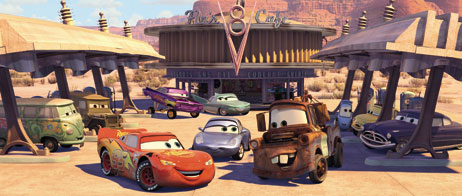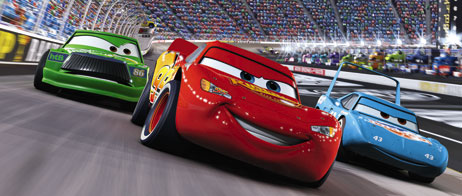
COMMENTARY
The Golden Touch
Around the midpoint of Cars, Pixar's new computer-animated feature, Lightning McQueen, a stock-car racing star, and Sally, the girl he has met in the little town of Radiator Springs, drive into the countryside and look out over a sweeping desert landscape. The idea is that Lightning, obsessed with fame and winning big races, has never before paused to take in the beauty of the world around him.

That "natural" beauty is, of course, computer-generated, and if there is a single living thing depicted in that scene, even a tree, it's not conspicuous. (Lightning and Sally pass among some evergreens earlier in their drive, and the trees really stick out; I can't recall any advanced plant or animal life elsewhere in Cars.) The two characters admiring the barren landscape are not only computer-generated but are themselves machines—a bright-red race car and a gleaming Porsche, cars that can think and talk. A film synthetic in every detail is admonishing us to relish the natural world.
There is, in other words, a subtle discrepancy between what the movie is telling us and what we're seeing on the screen. That's not much of a problem, in the movies or any other medium; artists bridge such gaps all the time, irony being the tool of choice. Here it may be tempting to believe that John Lasseter, Pixar's creative arbiter and Cars' director, has his tongue at least slightly in cheek; some of the buttes in the distance have contours suspiciously similar to those of automobile fenders. It's clear, though, that such features of the landscape are there less as a joke than as a way to make the world on the screen seem more hospitable to its population of talking cars and other machines. In Cars, Lasseter asks us to take all too seriously both Lightning and his transformation (today a selfish hot rod; tomorrow an upstanding family sedan). As a result, he makes his hero ridiculous and his film a frustrating bore.
Cars is not contemptibly bad in the manner of so many recent computer-generated features. The $70 million that the movie supposedly cost is all on the screen; to my eyes, the animation is flawless, on its own photo-realistic terms, and sometimes, as in the night scenes near the start, powerfully atmospheric. The movie-star voices for the characters are mostly good, although it's too obvious that they were recorded in a studio and not in the film's wide-open spaces. But Cars is easily the worst of Pixar's features, crippled throughout by the same suppressed awareness that Lasseter imposes on the scene in which Lightning swoons over the desert's artificial beauty.
Lasseter, who did not direct the three Pixar features that preceded Cars, even let himself be trapped inside what amounts to a live-action script. Neither Lightning nor any of the other characters need be automobiles; they could just as well be people, and all of the story's events could easily have been translated into live action. It would have been obvious then how bad the script is, how packed with clichés, non sequiturs, and stereotypes, ethnic and otherwise.
Comedy can't save Cars, because there aren't enough jokes. The film is full of quick cuts that encourage watching for sly gags, but more often than not there's nothing to see but vehicles of some kind, pretending to be people in mildly amusing ways. The gags that accompany the closing titles are wittier than anything in the body of the film.
If irony can close a gap between what's being said and what's being shown, sentimentality always opens such a gap wider. There is sentimentality aplenty in Cars. Lasseter was born in 1957, too late to remember the days the film rhapsodizes about—the days when people went for a drive, in long-gone makes like the Hudson Hornet, instead of just driving to get someplace. We are always most nostalgic about what we are too young to have experienced firsthand. (The film's éminence grise, "Doc Hudson," won his trophy races in 1951-53, a few years before Lasseter was born.) My father was a Hudson dealer when I was a kid, and we rode the family Hudson on drives into the country on Sunday afternoons. "Tiresome" is the word that springs to mind when I think about those outings. At least we listened to Bing Crosby on the radio; Cars can do no better, as it evokes the good old days, than a damp Randy Newman song.
It's difficult for me to believe that Lasseter would really like to resurrect the time when driving from one city to another meant winding through a lot of mostly dismal little towns. Well-planned high-speed roads—the autoroutes in France, for example, which don't rip through city centers in the destructive American manner—enhance the driving experience and make it easier to get to those small towns that are, unlike Radiator Springs, actually worth visiting.

Lasseter's sentimentality finds its most peculiar expression at the very heart of the movie's story, where he tries to blend his genuine affection for cars with his equally genuine desire to make movies that extol personal virtues. I know almost nothing about NASCAR, but its races have never struck me as a likely venue for lessons on friendship and caring and other qualities that Lasseter admires. Cars does nothing to change my mind.
I've always assumed that many of the people in NASCAR's stands come there in the hope of seeing a spectacular crash—the races, lap after lap, are otherwise as boring as those long-ago Sunday drives—and Cars, by offering several beautifully choreographed pileups and spin-outs, does its best to satisfy any similar longings in theater audiences. The villain car, Chick Hicks, causes a couple of those crashes by attacking his competitors, for all the world as if he were a charioteer in Ben-Hur. I don't know if such viciousness would go unchallenged in a real NASCAR race, but the movie shrugs off Hicks's quasi-homicidal behavior as requiring no more than a caution flag, thus raising the question: what kind of crazy "sport" is this, and why should we give a damn which maniac comes out on top?
Lasseter had little choice but to retreat from the violence and monotony of stock-car racing for much of Cars' running time (an interminable hour and 57 minutes—a Miyazaki length). Thus the middle of the film, where Lightning McQueen absorbs life lessons from the boobs and eccentrics who populate Radiator Springs. But there is no getting away from a climactic race between Lightning and Chick Hicks to break a tie for the Piston Cup, with a third car thrown in, just as there is no getting away from using the race as a showcase for Lightning's newly acquired sensitivity. Simply having Lightning beat Hicks would have exposed the barrenness of the racing milieu. Instead, Lasseter has Lightning deliberately throw the race—there's no other word for it—so that he can push the third car, the soon-to-be-retired "The King," over the finish line ahead of him.
The King (one of several characters voiced by a real NASCAR driver, in this case Richard Petty) has been disabled by one of Hicks's attacks, but he has until this point been an incidental character. There's no reason to care about him, and there's no visible reason for Lightning to care so much about him that he gives up first place and takes third instead. Lightning has, after all, been more than willing to beat The King, on this and other occasions, and his rationale for not beating him this time, that The King should be allowed to finish his last race, rings hollow. Would the same be true if The King had gone out on a blown tire?
Chick Hicks wins the Piston Cup, thanks to his attack on The King and Lightning's baffling self-sacrifice. Cars asks us to believe that race fans and corporate sponsors would turn their backs on Hicks despite his victory. On the film's own terms—that is, its presentation of Hicks's assaults as a naughty but acceptable way to conduct oneself on the track—such an outcome is simply not plausible. Here again, there's a discrepancy between Cars' message and what it shows us on the screen: the coarse, seductive glamour and razzle-dazzle of the world of professional stock-car racing. The inhabitants of that world might hesitate for a moment before cheering Chick Hicks, but cheer him they would. In stock-car racing, as with big-budget Hollywood movies, winning is what matters.
In Cars, however, Lasseter and his colleagues ask their audience to embrace the idea that winning isn't everything, that friendship and fellowship—which the Pixar people evidently enjoy in abdundance—count for a lot more. Should we believe, then, that Cars' box-office performance its first weekend was a matter of indifference at Emeryville? Cars finished behind the first-weekend figures for both Finding Nemo and The Incredibles, grossing about $60 million (not the $62.8 million originally reported) versus more than $70 million for each of the earlier films. The reviews—the more thoughtful reviews, in particular, as opposed to the reviews written on autopilot—have been surprisingly skeptical. Cars will turn a profit, no doubt, but the seeds of future failure have been sown in the nagging disappointment that many people will feel, especially in the weak closing minutes.
Cars opened just after the consummation of Disney's $7.4 billion purchase of Pixar. I have to wonder if Pixar's new proprietors in Burbank are still thrilled with their purchase—especially when they remember that Robert Iger's much-reviled predecessor as CEO, Michael Eisner, resisted paying so much.
Shortly before Cars' release, Premiere magazine named Lasseter and Steve Jobs, his boss at Pixar and now a board member at Disney, as the most powerful people in Hollywood. Lasseter was hailed repeatedly, when the Disney deal was announced and in the months afterward, as a new Walt Disney. Lasseter has presided over seven successful animated features, a string that Disney never matched; but Walt was far more ambitious than Lasseter has proved to be. Lasseter, shunning the difficulties of animating human characters, has settled for making children's films filled with toys and bugs and fish and automobiles—each film more technically sophisticated than the last, but each increasingly questionable as a story. The Lasseter who made Cars most resembles the Walt Disney who toward the end of his life made sentimental live-action wallows like Follow Me, Boys! and The Happiest Millionaire.
One Pixar film stands apart from the rest: The Incredibles (2004), directed by Brad Bird and far more Bird's film than Lasseter's. There is in it none of Lasseter's sentimentality; there is instead much greater risk-taking, in the animation of its human characters especially. A trailer for a Bird-directed effort called Ratatouille, the next Pixar feature, precedes the theatrical showings of Cars. Ratatouille is, I gather, a project dropped into Bird's lap after other people struggled with it. I found the trailer ominous. The title character is a rat, living in a Parisian restaurant, and the trailer shows him sampling a cheese cart, to the justified horror of diners and server. Rats have almost never been made into cartoon characters; they're filthy, disgusting animals, and people recoil from them for good reason. In the trailer, another rat advises Ratatouille to suppress the "gag reflex" so he can eat any disgusting thing, as the second rat is cheerfully doing. Will audiences have to suppress the "gag reflex" to sit through the film? Perhaps Lasseter should have hired John Kricfalusi to direct it.
Maybe Bird will surprise me—The Incredibles was much better than I expected it to be—but with Ratatouille he is working with far more suspect material. Of one thing we can be sure: if before Ratatouille's release next year some Disney shill like Time's Richard Corliss starts hailing Bird as the new Walt Disney, we should save our money, stay home, and watch Dumbo again on DVD.
[Posted June 17, 2006; revised June 20, 2006]